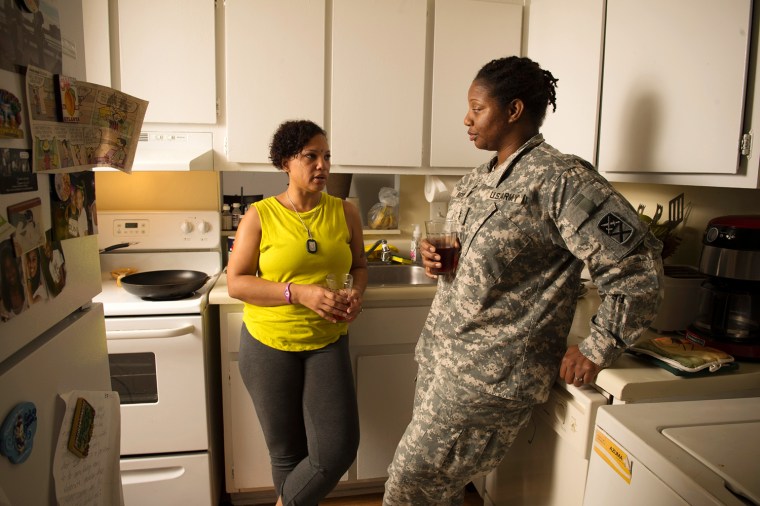
The first shutdown of the federal government in 17 years kicked in at 12:01 a.m. ET on Tuesday.
The lack of a resolution meant the government’s spending authority expired -- with national parks expected to close, homebuyers probably facing delays on government-backed mortgages, and an estimated 800,000 federal workers facing furlough.
The last time the government shut down, in late 1995 and early 1996, federal agencies stopped paying for veterans’ medical care, halted disease surveillance, shelved toxic cleanups, gated the national parks and sent hundreds of thousands of workers off the job without pay.
Here are some of the first people who are feeling the pinch.
Military wages cut off
“The mood is pretty grim at our house,” said Aaneesah Benson, the spouse of U.S. Army warrant officer LaShonda Benson, who served three tours in Iraq. The couple married in Iowa in January. They live in the Atlanta suburbs and have two children.
Active-duty troops could stop receiving their pay in mid-October, though they would still have to report for their assignments. They would be paid retroactively when the government goes back to work.
Still, the Benson household was watching nervously.
“We’re already living check to check, trying to figure out how to move money here to pay bills there. So I don’t know where we’ll be without her paycheck,” said Aaneesah Benson, who’s looking for a job in special education.
The Bensons trimmed household spending ahead of the shutdown. They bought a diesel car to reduce fuel costs for LaShonda's 75-mile commute to her installation in Alabama, where there is no base housing. The family plans to end Internet service and have their kids, 8 and 15, do computer homework at a public library. They’re leaning on donated haircuts, clothing and school supplies.
“I even had to apply for food stamps,” Aaneesah Benson said. “It’s that serious. It’s not preferable. But I had to swallow my pride. We have to do what we’ve got to do to eat.”
National parks closed
When the government was shuttered in 1995 and 1996 for four weeks amid budget squabbling between Democrats and Republicans, the economic shock waves rolled 3,000 miles across the country to Mariposa, Calif. The town of about 2,100 people, on the western fringe of Yosemite National Park, relies largely on tourist dollars for survival. Back then – as is likely again on Tuesday – the shutdown forced the immediate closure of all 59 national parks.
“Even two days of a shutdown would destroy tourism all over the country,” said Autrey Nassar, who operates a small business in Mariposa. “That’s because major tour groups in Europe and Asia plan these things far in advance, and if there’s even a slight chance the parks will be closed, they won’t come.
“We saw this in 1995. And even talking about closing the parks now, people will stop making reservations. It’s like if an American is planning to visit the Louvre — if the government there was talking about closing it, Americans wouldn’t be planning visits.”
Shortly before the 1995 government shutdown, a local couple opened a restaurant called Papa Taco, just off Mariposa’s main drag. When Yosemite’s gates were temporarily locked, many of Mariposa’s businesses needed two years to recover, Nassar said. During much of that time, the local restaurants often sat empty. Papa Taco went under. In its place now: a Burger King — and according to Nassar, it’s the only fast-food franchise in the entire county, a landmark to previous government dysfunction.
He has other concerns. His business is called Yosemite Weddings. He helps couples tie the knot amid the park’s soaring vistas.
“I have a lot of weddings in October,” Nassar said. “Right now, I don't have one couple who has called or emailed about what we do if the park closes. But (if that happens), the issue is going to drive our brides crazy. I know how brides are two weeks out from their wedding.”
Travelers tormented
Jacquie Whitt, owner of a small adventure travel company in Virginia, will fly to Peru in October. There, she will meet up with a medical mission, providing them guide service to Machu Picchu before they open their new clinic in the region.
But the shutdown at home may cause a major passport snafu for Whitt abroad — and put a planned mountain hike in jeopardy.
She recently renewed her passport via the U.S. Bureau of Consular Affairs, which processes the documents. She received her new passport in the mail. The government, however, has not yet returned her old one. (Typically, they are sent back separately, she said.)
If that agency closes shop and her old passport does not arrive before Whit departs, one of her hoped-for big hikes — to the ruins of Huayna Picchu — will have to be scrapped, she said. Due to that route’s extreme popularity and rules restricting the number of daily climbers, she had to book that hike long in advance, using her old passport number.
“I have a back-up plan to enter (the less restrictive) Machu Picchu,” Whitt said. “I will have to buy another ticket when I am there.”
She’s been through this before. Also in Peru.
“The last time we had a threat of government shutdown and the U.S. airlines delayed and canceled flights because the airport controllers were cutting back, we had several groups who missed some flights,” Whitt said. “It caused problems with trains and entry tickets. We had to send guides to stand in line at the rail office to try to get them changed. Not easy down there.”
NBC News' Erin McClam contributed to this report.